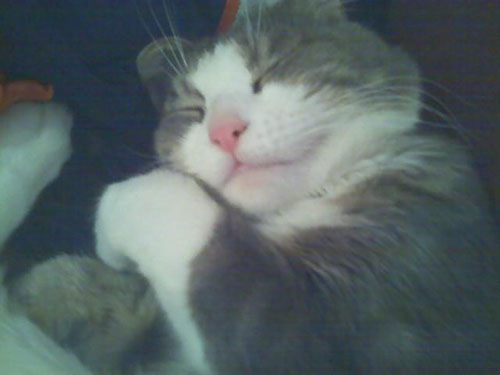Media – Eat More; Weigh Less
Not a Road Map to Feline Health
Tony is a 12 year old kitty who started fussing for food frequently. But when his family was petting him they realized that he wasn’t just being pesky. Despite packing away the groceries this feline senior was losing weight.
On physical exam Tony’s heart rate was faster than normal. Palpation of his internal organs, including his thyroid glands, revealed nothing unusual. So I submitted a comprehensive blood profile.
Cats with an AARP card (over age 10) should have an annual exam and lab profile including a thyroid screen. Last year Tony’s thyroid test, called a T4, was at the high end of the normal range. Last week it crossed the threshold into potentially dangerous territory. Hyperthyroidism (caused by benign tumors of the thyroid glands) can lead to serious trouble but it’s actually a “good” diagnosis.
This slow onset train wreck is common in kitties of a certain age but Tony doesn’t seem to care; he just wants an expanded smorgasbord. What he doesn’t know is that bigger helpings would not protect his heart from the damage of the escalating blood pressure of his disease.
There are treatment options. Tony could eat his way to better health with Hills prescription diet y/d. By limiting a cat’s iodine intake, thyroid hormone production is reduced and they improve. Sadly, those thyroid tumors just keep on growing anyway.
An oral medication called methimazole can lower thyroid hormone output but it doesn’t address the tumors either. Back in the day, surgical removal of the thyroid glands, a procedure I performed many times, was potentially curative but there was a downside. Having kissed their thyroid glands good bye, these old timers needed oral thyroid supplements for life.
Today’s best and safest treatment is injectable radioactive iodine. Only the thyroid glands pick it up, it gets rid of the excess tissue, and then passes in the urine. Several days of hospitalization avoids risk to the family. Dr. Dawn Nolan of the VCA Veterinary Care Animal Hospital in Albuquerque is licensed to administer radioactive iodine. Tony is our Nichol family cat so he gets nothing but the best. I’ll keep you posted on his progress.
Each week Dr. Jeff Nichol makes a short video, blog, or a Facebook Live to help bring out the best in pets. Sign up at no charge at drjeffnichol.com. Dr. Nichol treats behavior disorders at the Veterinary Emergency & Specialty Centers in Albuquerque and Santa Fe (505-792-5131). You can post pet behavioral or physical questions at facebook.com/drjeffnichol or by US Post to 4000 Montgomery Blvd. NE, Albuq, NM 87109.


